
Sawflies are wasp-like insects that are in the suborder Symphyta within the order Hymenoptera, alongside ants, bees, and wasps. The common name comes from the saw-like appearance of the ovipositor, which the females use to cut into the plants where they lay their eggs. The name is associated especially with the Tenthredinoidea, by far the largest superfamily in the suborder, with about 7,000 known species; in the entire suborder, there are 8,000 described species in more than 800 genera. Symphyta is paraphyletic, consisting of several basal groups within the order Hymenoptera, each one rooted inside the previous group, ending with the Apocrita which are not sawflies.

The Orussidae or the parasitic wood wasps represent a small family of sawflies ("Symphyta"). Currently, about 93 extant and four fossil species are known. They take a key position in phylogenetic analyses of Hymenoptera, because they form the sister taxon of the megadiverse apocritan wasps, and the common ancestor of Orussidae + Apocrita evolved parasitism for the first time in course of the evolution of the Hymenoptera. They are also the only sawflies with carnivorous larvae.

The Tenthredinoidea are the dominant superfamily of sawflies within the Symphyta, containing some 8,400 species worldwide, primarily in the family Tenthredinidae. All known larvae are phytophagous, and a number are considered pests.

Tenthredinidae is the largest family of sawflies, with well over 7,500 species worldwide, divided into 430 genera. Larvae are herbivores and typically feed on the foliage of trees and shrubs, with occasional exceptions that are leaf miners, stem borers, or gall makers. The larvae of externally feeding species resemble small caterpillars. As with all hymenopterans, common sawflies undergo complete metamorphosis.

Allantinae is a subfamily of sawflies in the family Tenthredinidae, and the largest subfamily of that family, with about 110 genera. The subfamily is considered to consist of five to six tribes, and are medium to large sawflies.

Monostegia is a genus of sawfly. The authority is based on the description by Achille Costa and Oronzio Costa, although earlier work grants this to Fabricius 1798., though the most common species, M. abdominalis, bears the authority of Fabricius.

Aglaostigma aucupariae is a Palearctic species of sawfly.

Dolerus bajulus is a Palearctic species of sawfly.

Arge ustulata is a Palearctic species of sawfly.
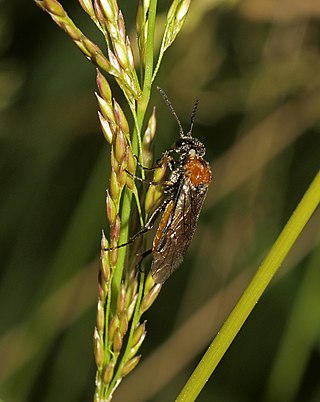
Dolerus aericeps is a Palearctic species of sawfly.

Dolerus germanicus is a Palearctic species of sawfly.
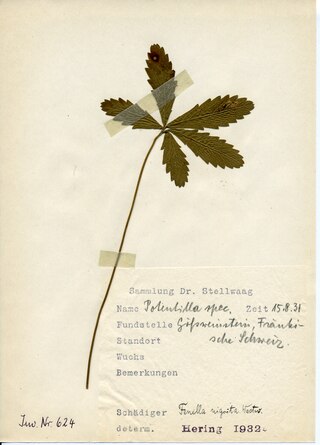
Fenella nigrita is a Palearctic species of sawfly.
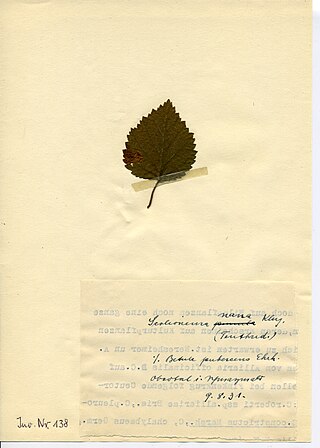
Fenusella nana is a Palearctic species of sawfly. It occurs throughout the British Isles.
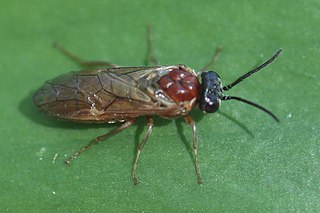
Periclista albida is a Palearctic species of sawfly.

Pristiphora cincta is a Holarctic species of sawfly.
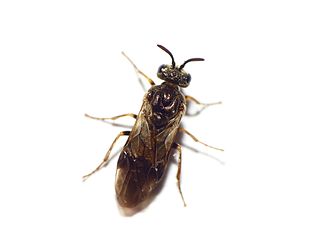
Sterictiphora geminata is a Palearctic species of sawfly.
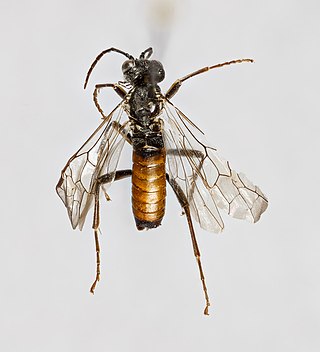
Tenthredo balteata is a Palearctic species of sawfly.

Tenthredo mioceras is a Palearctic species of sawfly.
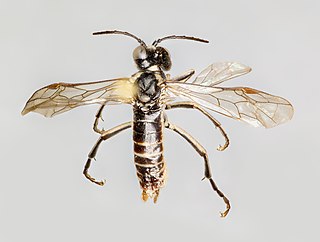
Tenthredo obsoleta is a Palearctic species of sawfly.

Trichiosoma vitellina is a Palearctic species of sawfly.



















